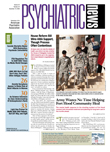Women who experience anxiety, and especially somatic symptoms such as heart palpitations, chest pain, skin flushing, or muscle twitching, may be at an increased risk of having a heart attack. So reported Hermann Nabi, Ph.D., of INSERM (France's National Institute for Health and Medical Research) and colleagues online October 12 in Biological Psychiatry.
The finding derived from a large prospective study of Finnish men and women, altogether some 24,000 subjects, aged 20 to 54 when the study started.
The subjects were assessed with an instrument that measures psychological symptoms of anxiety such as feeling tense or nervous, finding one's daily activities extremely trying and stressful, or feeling exhausted mentally and physically at the end of the day. The subjects were also assessed with an instrument that measures somatic symptoms of anxiety disorders listed in DSM-IV or the International Classification of Diseases—10th Revision (ICD-10). These symptoms included palpitation without exercise, irregular heartbeat, chest pain upon anger or emotion, sweating without exercise, flushing, tremor of hands or voice, and muscle twitching.
The subjects were then followed for seven years to determine which of them experienced a fatal or nonfatal cardiac event, such as a heart attack or clinically verified angina pectoris. A total of 209 experienced such an event—151 men and 58 women.
The researchers then used the results of psychological and somatic symptom assessments and the cardiac-event findings to determine whether any of them were related to increased heart attack risk. During these evaluations, they took possibly confounding factors, such as sociodemographics, biobehavioral risk factors, and clinically significant symptoms of depression into consideration. Depression, of course, has been strongly linked to heart disease in its own right (Psychiatric News, October 2).
Neither psychological nor somatic anxiety symptoms predicted cardiac events in men. However, both, especially somatic symptoms, predicted cardiac events in women.
These results jibe with those of three previous prospective studies conducted in women-only populations. Panic attacks, phobic anxiety, and symptoms of tension and anxiety were found to be strongly associated with heart disease or sudden cardiac death in those studies.
So why might anxiety, particularly somatically expressed anxiety, put women at risk of a cardiac event? “The robust association between somatic symptoms of anxiety and heart disease in women, compared with men, could be related to gender differences in the experience and impact of anxiety on health,” Nabi and his coworkers suggested. “Indeed, we found gender-related differences in reports of anxiety symptoms, with men scoring higher on the psychological symptoms of anxiety and women scoring higher on the somatic symptoms of anxiety.”
The study was funded by the Academy of Finland, U.S. National Institutes of Health, European Science Foundation, Finnish Heart Foundation, and Yrjo Jahnson Foundation.
An abstract of “Psychological and Somatic Symptoms of Anxiety and Risk of Coronary Heart Disease: The Health and Social Support Prospective Cohort Study” is posted at <www.journals.elsevierhealth.com/periodicals/bps> under “Articles in Press.” 
